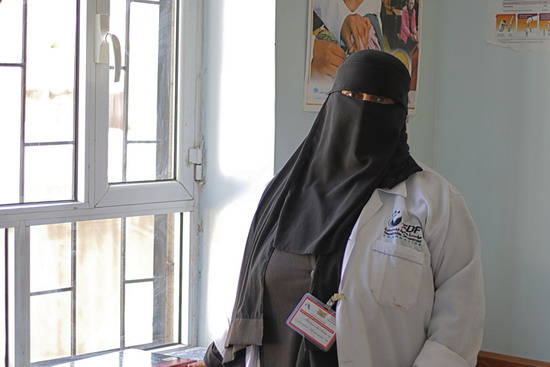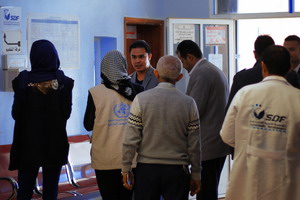 Safia Ahmed, has been working as a nurse for 20 years now. She currently works at Al Fawaris health centre supported by the Minimum Service Package. Due to the ongoing war in Yemen she has lost her her income.
Safia Ahmed, has been working as a nurse for 20 years now. She currently works at Al Fawaris health centre supported by the Minimum Service Package. Due to the ongoing war in Yemen she has lost her her income.
19 February 2019 – With a health system on the brink of collapse, and ongoing conflict causing one of the largest humanitarian crises in the world, the health needs in Yemen are massive.
 The MSP is a health delivery mechanism aiming at strengthening the access and availability of health care services therefore strengthening the health system in YemenThe Minimum Service Package (MSP) is a health delivery mechanism aimed at strengthening the access and availability of health care services therefore strengthening the health system in Yemen. Through the framework of the MSP, WHO in cooperation with health authorities and partners, is able to support the provision of primary health care services at the district level in 135 districts. Providing this access means that access to health care should not be an impediment, especially for vulnerable people in remote areas, where health facilities are either closed or lacking the needed supplies due to the ongoing war. Many people have to travel for hours to reach the closest facility putting them at risk of death.
The MSP is a health delivery mechanism aiming at strengthening the access and availability of health care services therefore strengthening the health system in YemenThe Minimum Service Package (MSP) is a health delivery mechanism aimed at strengthening the access and availability of health care services therefore strengthening the health system in Yemen. Through the framework of the MSP, WHO in cooperation with health authorities and partners, is able to support the provision of primary health care services at the district level in 135 districts. Providing this access means that access to health care should not be an impediment, especially for vulnerable people in remote areas, where health facilities are either closed or lacking the needed supplies due to the ongoing war. Many people have to travel for hours to reach the closest facility putting them at risk of death.
Dr Hamid Al Hammadi, Director of Al Fawaris hospital, says that the support from WHO has enabled the health centre to provide primary health care for at least 10 000 people residing in the area who do not have access to health care nearby. “This project is critical and timely. Before the support the centre was functional for 5 hours a day only. Now we are able to operate 24 hours a day, 7 days a week,” he adds. The centre is now capable of providing maternal care, emergency care, laboratory tests and medical supplies.
Health workers are not forgotten
Since the beginning of the conflict 4 years ago, health workers in Yemen have struggled greatly to provide essential health care. Across the country, they work tirelessly without being paid and in turn cannot provide for and support their families. Providing incentives within the MSP ensures health workers are not forgotten.
Safia Ahmed works at Al Fawaris health centre supported by the MSP. She has been working as a nurse for 20 years now, and the ongoing war in Yemen has caused her to lose her income, like thousands of civil servants and pensioners who have not been paid salaries and bursaries for years due to the humanitarian situation.
“I now work here and thanks to the incentives paid by WHO, I am able to provide for my family. This support means a lot to us as health workers because it gives us a sense of purpose,” says Safia. Before this support, Safia would work 2 shifts for months on end without getting paid.
WHO expresses thanks to all donors and partners supporting the MSP in Yemen, including Italian Agency for Cooperation and Development, United Nations Central Emergency Response Fund and the Government of Kuwait. In 2019, WHO aims to make health services more accessible and available to 15 million people across Yemen.
Related links
Italian Agency for Development Cooperation








